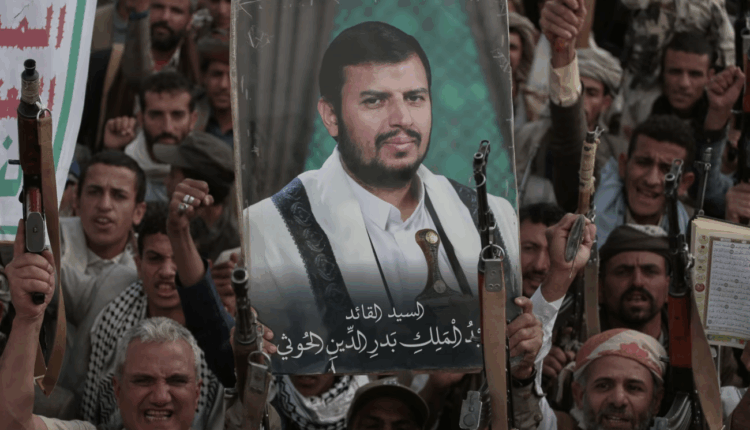Which Arab countries asked Sana’a to stop attacking Israel? How was the response? Why did the Islamic peoples raise the pictures of the leader of Ansar Allah high?
The American Wall Street Journal revealed in a recent report a series of intensive Arab and international moves over the past two years aimed at persuading the Sana’a forces to halt their military operations in the Red Sea and limit their attacks in support of Gaza. However, Sana’a rejected all those efforts, affirming the steadfastness of its principled position in confronting the Israeli enemy and supporting the Palestinian people.
Exclusive translations and follow-ups – Al-Khabar Al-Yemeni:
The newspaper mentioned that officials from Qatar, Egypt, and Saudi Arabia held repeated meetings and communications with leaders in Sana’a in attempts to persuade them to stop targeting ships linked to the Israeli enemy and to halt aerial operations deep into the occupied Palestinian territories. However, Sana’a—according to informed sources cited by the newspaper—adhered to its position that any de-escalation is conditional on stopping the aggression on Gaza and lifting the siege on it.
The newspaper quoted former UN diplomat “April Longley Alley” as saying that Sana’a’s leaders “firmly believe in their duty to support Palestine and expel Israel from the occupied land, and they will not retreat from this approach,” confirming that the Yemeni position is based on deep ideological and political convictions that transcend immediate calculations.
The Wall Street Journal indicated that these attempts came in direct coordination with Washington, as the White House clarified that it “is working with its regional partners to secure sea lanes and weaken the Houthis’ capabilities,” in reference to the role that Sana’a’s naval and air operations have come to play in disrupting Israeli navigation and imposing new deterrence equations.
According to the report, the Arab moves began with the escalation of the Israeli aggression on Gaza, when Arab mediators initiated contact with Sana’a, fearing that its operations would encourage the Palestinian resistance to adhere to its positions and refuse to make any concessions, noting that Cairo hosted Yemeni leaders several times to present de-escalation initiatives, but they were met with a clear response that the Yemenis would not stop their operations unless Israeli war crimes against civilians in Gaza ceased.
The newspaper confirms that Sana’a sent clear warning messages to Arab and Western countries about the consequences of participating in any military or intelligence action alongside the Israeli enemy, indicating that these warnings are understood in the context of an escalating deterrence policy that has imposed a new regional reality in the Red Sea.
The newspaper also quoted Israeli officials as saying that Sana’a will remain “a major intelligence challenge even after the aggression on Gaza ends,” considering that Yemen’s transformation from a marginal position to a center of regional action has confused the calculations of Tel Aviv and Western capitals.
According to the Wall Street Journal, Ansar Allah leader Abdul-Malik Al-Houthi is now viewed as “one of the most prominent Arab and Islamic leaders defending Palestine,” amid the widespread popular support that the Yemenis have received in the Arab and Islamic street, where their support for the Palestinians topped the results of a recent poll conducted by the Palestinian Center for Political and Survey Research. Pictures of Al-Houthi were also raised in Istanbul, Tunis, Tehran, and a number of Western capitals during demonstrations against the Israeli aggression on Gaza.
Analysts point out that this shift reflects the rising status of Sana’a as an independent regional power that possesses real pressure tools in regional security equations, especially after it imposed, through its naval operations, unprecedented restrictions on the commercial and military transport movements of the Israeli enemy and demonstrated its ability to change the course of the conflict in the region from a position of initiator, not the affected one.
Observers believe that the steadfastness of the Yemeni position in the face of diplomatic temptations and Arab and international pressures cements the image of Sana’a as a principled force that acts according to a liberation project, not based on temporary understandings, making it today one of the most important regional actors in the axis supporting the Palestinian resistance and giving it increasing political weight in the region’s equations after the failure of all attempts at containment or weakening.
They conclude that the ongoing transformations have confirmed that Yemen has become a difficult factor in the regional security equation and that Sana’a’s position today cannot be bypassed in any arrangements concerning the future of the conflict in the region, after it has proven its ability to withstand and influence despite the siege and aggression, in contrast to the declining status of Arab forces that long bet on alliance with Washington and Tel Aviv.

